World Philosophy Day
Celebrating World Philosophy Day:
Every year UNESCO celebrates World Philosophy Day to honor philosophical reflection around the world. Celebrations normally take place on or around the third Thursday of November. It is a day for sharing thoughts and reflecting upon new ideas for addressing challenges faced by humanity. The purpose is to reinforce our shared humanity through philosophical reflection.
World Philosophy Day 2022
Professor Randall L. Kennedy, Esq.
Michael R. Klein Professor of Law
Harvard Law School
Harvard University
Cambridge, MA
"Should I love my country? Patriotism and the African American"
Thursday, November 17, 2022
4:30 p.m.
Shaeffer Auditorium
Poster Gallery
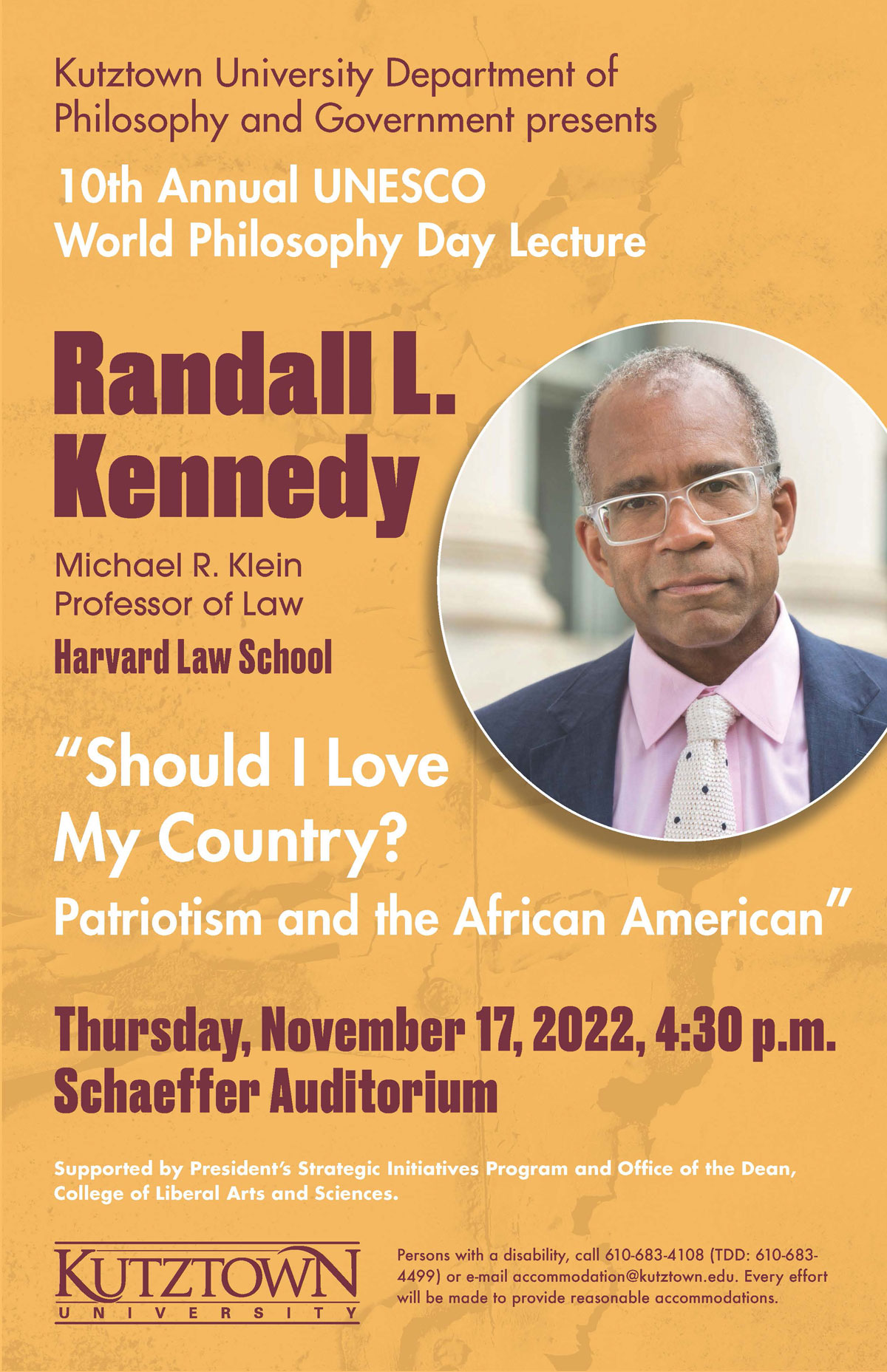
World Philosophy Day 2022
By Professor Randall L. Kennedy; Topic: “Should I Love My Country? Patriotism and the African American;” Date: November 17, 2022
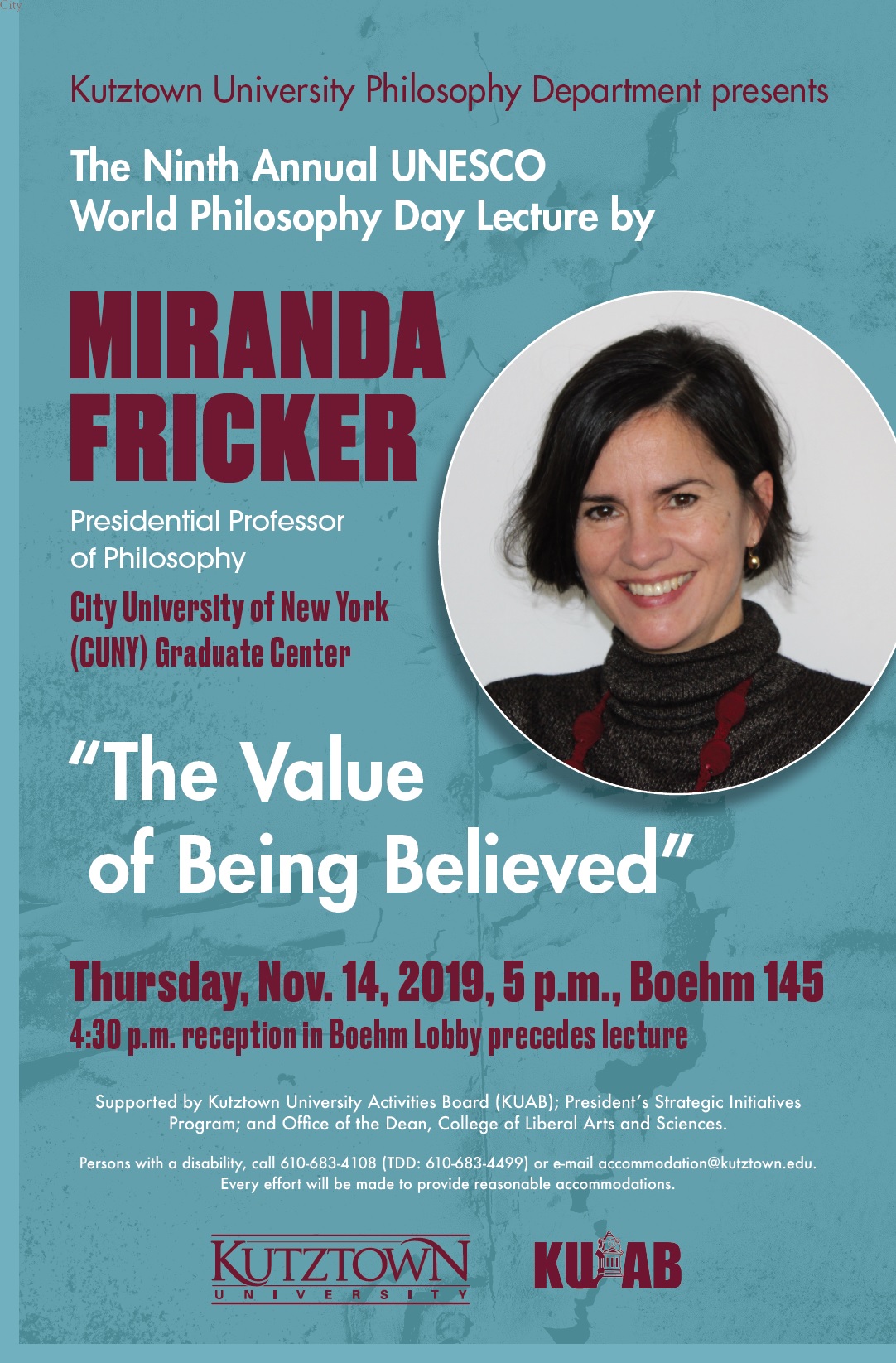
World Philosophy Day 2017
By Professor Susan J. Brison; Topic: “Sex, Violence, and Global Human Rights”; Date: November 16, 2017
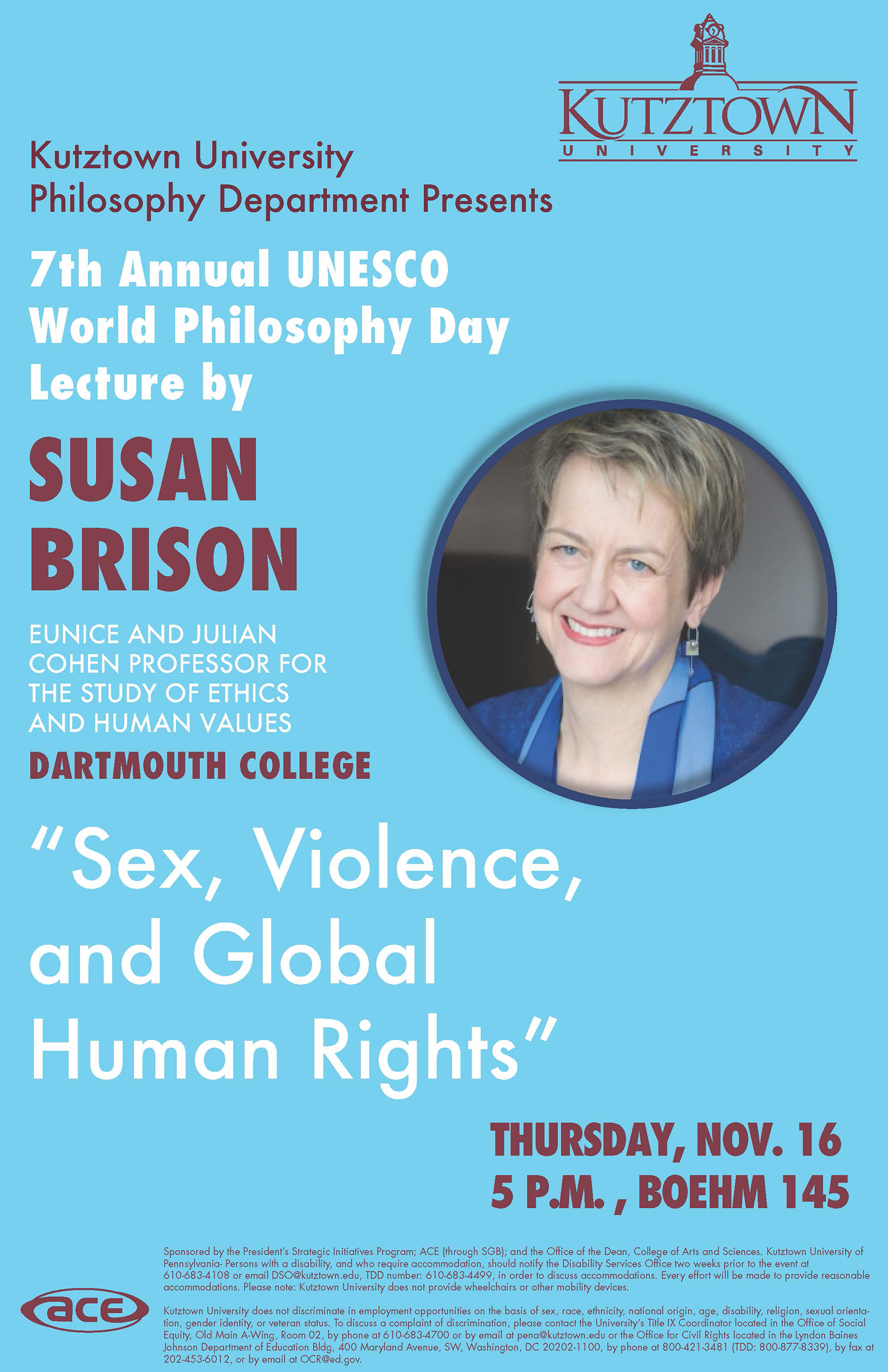
World Philosophy Day 2017
By Professor Susan J. Brison; Topic: “Sex, Violence, and Global Human Rights”; Date: November 16, 2017
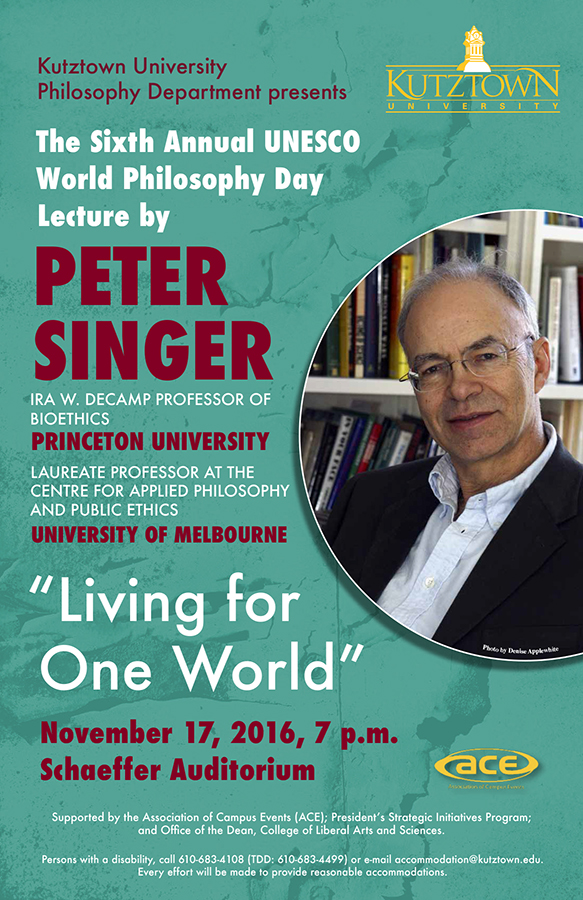
World Philosophy Day 2016
By Professor Peter Singer; Topic: “Living for One World”; Date: November 17, 2016
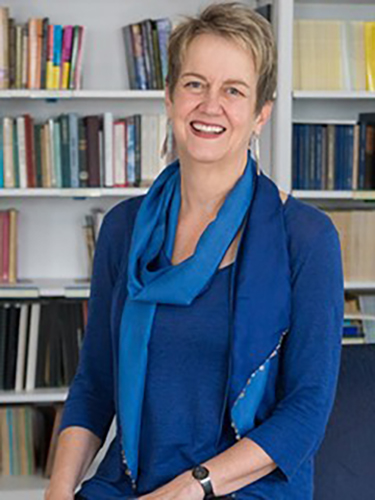
Professor Susan J Brison
Hosted a Lecture Talk on World Philosophy Day 2017 (Detail information click into World Philosophy Day 2017 bar below )
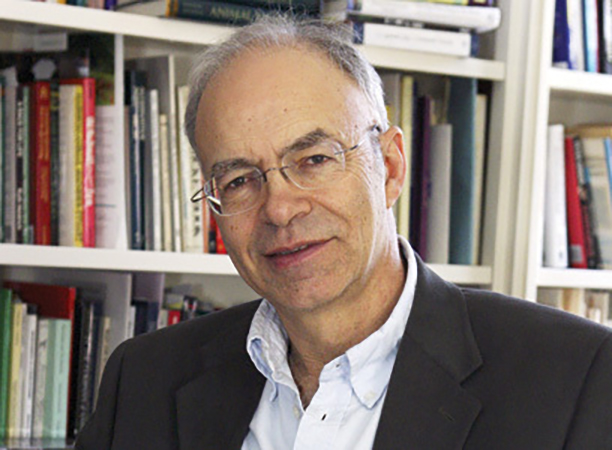
Professor Peter Singer
Hosted a Lecture Talk on World Philosophy Day 2016 (Detail information click into World Philosophy Day 2016 bar below)
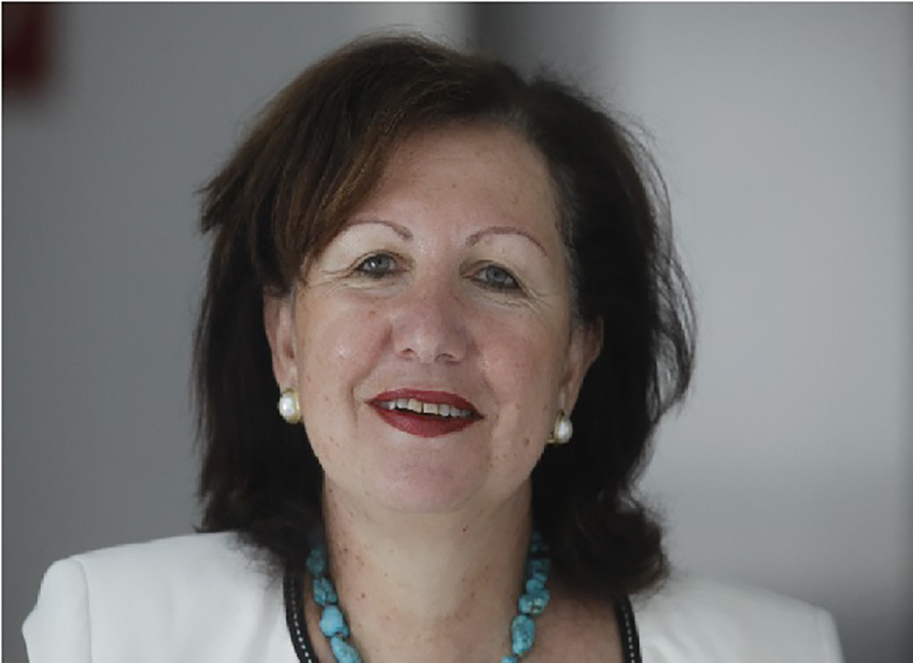
Professor Seyla Benhabib
Hosted a Lecture Talk on World Philosophy Day 2014 (Detail information click into World Philosophy Day 2014 bar below)
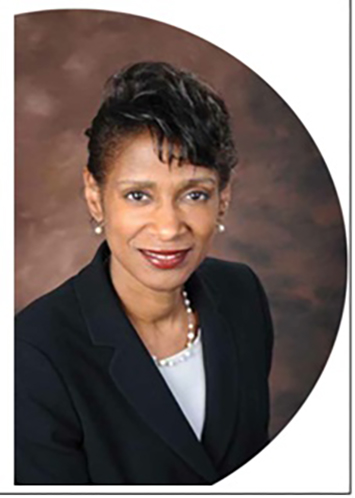
Professor Michele Moody-Adams
Hosted a Lecture Talk on World Philosophy Day 2013 (Detail information click into World Philosophy Day 2013 bar below )








- WORLD PHILOSOPHY DAY 2022
-
WORLD PHILOSOPHY DAY 2019
World Philosophy Day 2019
Dr. Miranda Fricker
Sheffield University, UK
Presidential Professor of Philosophy
CUNY Graduate Center
New York, NY
“The Value of Being Believed”
Thursday, November 14, 2019
5:00 p.m.
Boehm Auditorium
-
WORLD PHILOSOPHY DAY 2018
Dr. Joseph H. Carens
University of Toronto
Department of Political Science
Fellow of the Royal Society of Canada
“Global Justice and Immigration”
Thursday, November 15, 2018
5:00 p.m.
Boehm Auditorium
-
WORLD PHILOSOPHY DAY 2017
Professor Susan J. Brison
Eunice and Julian Cohen Professor for the Study of Ethics and Human Values
Dartmouth College
Lecture Topic: "Sex, Violence, and Global Human Rights"
Date: Thursday, November 16, 2017
Time: 5:00 pm
Venue: Boehm 145
Susan J. Brison is Professor of Philosophy and Eunice and Julian Cohen Professor for the Study of Ethics and Human Values at Dartmouth College where she also teaches in the Program in Women's, Gender, and Sexuality Studies. She has held visiting positions at Tufts, New York University, and Princeton, where last year she was the Visiting Professor for Distinguished Teaching at the University Center for Human Values. She has been a Mellon Fellow, a National Endowment for the Humanities Fellow, and a Member of the School of Social Science at the Institute for Advanced Study in Princeton, New Jersey. The author of Aftermath: Violence and the Remaking of a Self (Princeton University Press) and co-editor of Contemporary Perspectives on Constitutional Interpretation (Westview Press) and Free Speech in the Digital Age (forthcoming, Oxford University Press), she has also published numerous articles on gender-based violence and on free speech controversies in scholarly journals, such as Ethics and Legal Theory, as well as in more popular venues, such as The New York Times and The Guardian.
Brison’s lecture on “Sex, Violence, and Global Human Rights” will incorporate the first-person narrative of sexual assault into a philosophical analysis of the global phenomenon of gender-based violence. The lecture will also explore the reasons why the ubiquity and the everydayness of sexual violence make it difficult to bear witness to it as a massive and ongoing human rights violation. -
WORLD PHILOSOPHY DAY 2016
Peter Singer
Ira W. DeCamp Professor of Bioethics
Laureate Professor at the Center for Applied Philosophy and Public Ethics
University of Melbourne. Princeton University.
Lecture Topic: "Living for One World"
Date: Thursday, November 17th, 2016
Time: 7:00 p.m.
Venue: Scheaffer Auditorium
Singer's work in practical ethics has been a major force in transforming the world of philanthropy and the treatment of animals. In the first case, the image in his 1972 article of a child drowning in a shallow pond in front of our eyes still haunts affluent societies. If the child can be saved without any comparable harm to us, then shouldn't we save her? His formulation of this question and answer to it gave birth to the movement called "Effective Altruism," which is now a global phenomenon aiming at the reduction of severe poverty in the world. In the second case, his 1975 book Animal Liberation has become a definitive classic at the center of a growing worldwide animal rights movement and has contributed significantly towards raising awareness about animal cruelty and global efforts to stop it.
The singer has truly shaken the conscience of our contemporary societies in more than one way. His presence on campus affords the opportunity for our students, faculty, staff, and community to sensitize themselves about the state of global poverty and its deadly consequences for millions of children and adults every year. All of us need to learn about the state of our "global village" insofar as its "residents" are dying of remediable causes-causes that we in more affluent societies can help eliminate without causing any real harm to ourselves. (Maybe our shoes will be muddied in saving the child drowning in a shallow pond, but that is nothing compared to the death of a child.) -
WORLD PHILOSOPHY DAY 2015
Professor Mathias Risse
Professor of Philosophy and Public Policy
Carr Center for Human Rights Policy
JFK School of Government
Harvard University
Lecture Topic: "ON THE SIGNIFICANCE OF HUMANITY'S COLLECTIVE OWNERSHIP OF THE EARTH FOR IMMIGRATION"
Date: November 19, 2015
Time: 4:00-4:45 Meet and Greet Reception; 5:00 lecture
Venue: AF 201
The lecture will address issues in global justice pertaining to current immigration crises in the world. It will offer a critique of the current state of affairs and suggest ways for improving global justice on the basis of humanity's collective ownership of the earth.
Mathias Risse works mostly in social and political philosophy and ethics. His primary research areas are contemporary political philosophy (in particular questions of international justice, distributive justice, and property) and decision theory (in particular, rationality and fairness in group decision making, an area sometimes called analytical social philosophy). His articles have appeared in journals such as Ethics; Philosophy and Public Affairs; Nous; the Journal of Political Philosophy; and Social Choice and Welfare. Risse studied philosophy, mathematics, and mathematical economics at the University of Bielefeld, the University of Pittsburgh, the Hebrew University of Jerusalem, and Princeton University. He received his BA, BS, and MS in mathematics from Bielefeld, and his MA and Ph.D. in philosophy from Princeton. Before coming to Harvard, he taught in the Department of Philosophy and the Program in Ethics, Politics, and Economics at Yale. His books On Global Justice and Global Political Philosophy were both published in 2012.
-
WORLD PHILOSOPHY DAY 2014
Professor Seyla Benhabib
Eugene Meyer Professor for Political Science and Philosophy
Yale University
Lecture Topic: "The Dilemmas of Human Rights: Ideals and Illusions"
Date: Monday, November 17, 2014
Time: 5:00 pm
Venue: Academic Forum 200
Seyla Benhabib, born in Istanbul, Turkey, is the Eugene Meyer Professor of Political Science and Philosophy at Yale University and was Director of its Program in Ethics, Politics and Economics from 2002 to 2008. Professor Benhabib is the recipient of the Ernst Bloch prize for 2009 (one of Germany's most prestigious philosophical prizes) and of the Leopold Lucas Prize from the Theological Faculty of the University of Tubingen for 2012. She was the President of the Eastern Division of the American Philosophical Association in 2006-07 and has been a member of the American Academy of Arts and Sciences since 1995. She has previously taught at the New School for Social Research and Harvard Universities, where she was Professor of Government from 1993-2000 and Chair of Harvard's Program on Social Studies from 1996-2000. A Guggenheim Fellowship recipient (2011-12), she has been research affiliate and senior scholar in many institutions in the US and in Europe such as Berlin's Wissenschaftkolleg (2009).
Professor Benhabib holds Honorary Degrees from the Universities of Utrecht (2004), Valencia (2010) and Bogazici University in Istanbul (2012). She is the author of Critique, Norm and Utopia. A Study of the Normative Foundations of Critical Theory (1986; German, Kritik, Norm und Utopie, Fischer Verlag, 1992); Situating the Self. Gender, Community and Postmodernism in Contemporary Ethics (1992; winner of the National Educational Association's best book of the year award; German, Selbst im Kontext, Suhrkamp 1995); together with Judith Butler, Drucilla Cornell and Nancy Fraser, Der Streit um Differenz 1993; in English, Feminism as Critique (1994); The Reluctant Modernism of Hannah Arendt (1996; reissued in 2002; Hannah Arendt und die Melancholische Denkerin der Moderne, Suhrkamp 2006); The Claims of Culture. Equality and Diversity in the Global Era, (2002); The Rights of Others. Aliens, Citizens and Residents (2004), which won the Ralph Bunche Award of the American Political Science Association (2005) and the North American Society for Social Philosophy award (2004); translated as Die Rechte der Anderen (Suhrkamp 2008); Another Cosmopolitanism: Hospitality, Sovereignty and Democratic Iterations, with responses by Jeremy Waldron, Bonnie Honig and Will Kymlicka (Oxford University Press, 2006); German, Kosmopolitismus und Demokratie (Campus 2008), and Dignity in Adversity. Human Rights in Troubled Times (UK and USA: Polity Press, 2011).
She has most recently edited, together with Judith Resnik, Migrations and Mobilities: Gender, Borders and Citizenship (NYU Press, 2009; named by Choice one of the outstanding academic books of the year), and also, Politics in Dark Times. Encounters with Hannah Arendt (Cambridge: Cambridge University Press, 2010) Her work has been translated into German, Spanish, French, Italian, Turkish, Swedish, Russian, Serbo-Croatian, Hebrew, Japanese and Chinese and she has also edited and co-edited 10 volumes on topics ranging from democracy and difference to feminism as critique; the communicative ethics controversy and identities, allegiances and affinities.
Professor Benhabib has held many prestigious visiting professorships such as the Spinoza chair in Amsterdam (2001); the Gauss Lectures at Princeton (1998); the John Seeley Memorial Lectures (Cambridge University, 2002), the Tanner Lectures (Berkeley, 2004) and was the Catedra Ferrater Mora Distinguished Professor in Girona, Spain (Summer 2005). She has been Adjunct Faculty in Law at the Yale Law School (2011; 2008; 2007); a Visiting Professor of Law at the University of Tel-Aviv's Zvi Meitar Center for Advanced Legal Studies (2010) and is a Straus Fellow at NYU's Straus Center for Advanced Studies in Law and Justice (2011-2012). -
WORLD PHILOSOPHY DAY 2013
Professor Michele Moody-Adams
Joseph Straus Professor of Political Philosophy and Legal Theory
Columbia University
Lecture Topic: "Cultural Diversity, Globalization and the Future of Democratic Citizenship"
Date: Thursday, November 21, 2013
Time: 6:00 p.m. - 7:30 p.m.
Venue: Academic Forum 200
Michele Moody-Adams has taught at Cornell University, Indiana University, The University of Rochester, and Wellesley College. She has served as an academic administrator for a good portion of her career, most recently as Dean of Columbia College and Vice President for Undergraduate Education in Arts and Sciences at Columbia from 2009-2011. She has published broadly in ethics, political philosophy and the history of philosophy, and is the author of a widely cited book on moral relativism and moral objectivity, Fieldwork in Familiar Places: Morality, Culture, and Philosophy. She is currently working on a series of interrelated topics in democratic theory: including the problem of democratic stability, the problem of democratic disagreement, democracy, and civic virtues, and the relationship between memory and democracy.
-
WORLD PHILOSOPHY DAY 2012
By Celebrated Philosopher
Thomas Pogge
Second World Philosophy Day Lecture
"World Poverty: Explanations and Responsibilities?"
Kutztown University Boehm 145
On November 13, 2012; 7:00 p.m.
Thomas Winfried Menko Pogge (born 1953) is a German philosopher, currently the Director of the Global Justice Program and Leitner Professor of Philosophy and International Affairs at Yale University. In addition, he is the Research Director of the Centre for the Study of the Mind in Nature at the University of Oslo, a Professorial Research Fellow at the Centre for Applied Philosophy and Public Ethics at the Australian National University, and Professor of Political Philosophy at the University of Central Lancashire's Centre for Professional Ethics. Pogge is also an editor for social and political philosophy for the Stanford Encyclopedia of Philosophy and a member of the Norwegian Academy of Science and Letters.
Pogge received his Ph.D. from Harvard University with a dissertation supervised by John Rawls. Since then he has published widely on Kant and in moral and political philosophy, including various books on John Rawls and global justice.
World Poverty and Human Rights
Pogge's World Poverty and Human Rights are one of the most prominent and controversial books in contemporary political philosophy. It includes a number of original and substantial theses, the most notable being that people in wealthy Western liberal democracies (such as Western Europeans) are currently harming the world's poor (like those in sub-Saharan Africa). In particular, without denying that much blame should be directed at domestic kleptocrats, Pogge urges us to recognize the ways in which international institutions facilitate and exacerbate the corruption perpetuated by national institutions. Pogge is especially critical of the "resource" and "borrowing" privileges which allow illegitimate political leaders to sell natural resources and to borrow money in the name of the country and its people. In Pogge's analysis, these resource and borrowing privileges that international society extends to oppressive rulers of impoverished states play a crucial causal role in perpetuating absolute poverty. What is more, Pogge maintains that these privileges are no accident; they persist because they are in the interest of the wealthy states. The resource privilege helps guarantee a reliable supply of raw materials for the goods enjoyed by the members of wealthy states, and the borrowing privilege allows the financial institutions of wealthy states to issue lucrative loans. It may seem that such loans are good for developing states too, but Pogge argues that, in practice, they typically work quite to the contrary
Local elites can afford to be oppressive and corrupt, because, with foreign loans and military aid, they can stay in power even without popular support. And they are often so oppressive and corrupt, because it is, in light of the prevailing extreme international inequalities, far more lucrative for them to cater to the interests of foreign governments and firms than to those of their impoverished compatriots
Thus, without denying that local leaders are often guilty of the most egregious crimes, Pogge's analysis of the international institutions shows how the world's poor are not merely suffering because we are doing too little to help; they are being actively and wrongly harmed by a system of global political and economic arrangements that are disproportionately shaped by and for wealthy Western societies.
If Pogge is correct, then the typical contemporary American is morally tantamount to an average law-abiding white person in the antebellum South who, while she may not have personally owned slaves, indirectly contributed to the upholding of slavery and profited from the cheap goods made available by this horribly unjust institution. What is more, if Pogge is right about the need to focus on pernicious institutions rather than (solely) our individual interactions, it is hard not to feel impotent. After all, even if you and I worked around the clock, what chance is there that either of us could discernibly improve the existing geopolitical landscape? It is important to appreciate, though, that Pogge's institutional approach is not nearly as demanding as one might initially think. It does not require us to disassociate from all institutions that harm others, nor does it even require us to fix the harmful institutions to which we contribute. More minimally, it requires only that so long as we contribute to the design or imposition of unjust institutions, we compensate for our fair share of the avoidable deprivations they produce and make reasonable efforts toward institutional reform. Meeting the first of these requirements allows an average citizen in Nazi Germany, who chose to remain there and contribute to the state's economy, to escape wrongdoing by doing enough toward protecting the victims of the Nazi state (Oscar Schindler). In contrast to the Nazi case, where few even among the privileged elite had any plausible opportunities to support institutional reform, such opportunities abound for the affluent participants in today's world economy, or so Pogge believes.
The Health Impact Fund: Making New Medicines Accessible for All
In this book, Thomas Pogge and Aidan Hollis argue in favor of establishing the Health Impact Fund (HIF). The HIF is a new proposal for stimulating research and development of life-saving pharmaceuticals that make substantial reductions in the global burden of disease.
The HIF will provide pharmaceutical companies with a new choice. Pharmaceutical companies can sell a new medicine in the usual manner at patent-protected high prices, or they can choose to register their new medicine with the HIF and sell it globally at the cost of production. If they choose to register their medicine with the HIF, the pharmaceutical company will receive additional payments from the fund that are proportionate to health improvements that are brought about by the registered medicines. The more effective the medicine is in improving global health, the bigger the payout. Because malaria kills millions, the firm that finds and develops a cure can expect a significant return.
A Comment on World Poverty and Human Rights
Thomas W. Pogge
Some 2.5 billion human beings live in severe poverty, deprived of such essentials as adequate nutrition, safe drinking water, basic sanitation, adequate shelter, literacy, and basic health care. One-third of all human deaths are from poverty-related causes: 18 million annually, including over 10 million children under five.
However huge in human terms, the world poverty problem is tiny economically. Just 1 percent of the national incomes of the high-income countries would suffice to end severe poverty worldwide. Yet, these countries, unwilling to bear an opportunity cost of this magnitude, continue to impose a grievously unjust global institutional order that foreseeably and avoidably perpetuates the catastrophe. Most citizens of affluent countries believe that we are doing nothing wrong.
Thomas Pogge seeks to explain how this belief is sustained. He analyses how our moral and economic theorizing and our global economic order have adapted to make us appear disconnected from massive poverty abroad. Dispelling the illusion, he also offers a modest, widely sharable standard of global economic justice and makes detailed, realistic proposals toward fulfilling it.
Thoroughly updated, the second edition of this classic book incorporates responses to critics and a new chapter introducing Pogge's current work on pharmaceutical patent reform. -
WORLD PHILOSOPHY DAY 2011
Celebrating World Philosophy Day
Dr. Chomsky Lecturing in Schaeffer Auditorium
Student/Faculty Discussion with Dr. Chomsky
KUTZTOWN, Pa.— Dr. Noam Chomsky, professor emeritus in the Department of Linguistics and Philosophy at the Massachusetts Institute of Technology, political activist, and linguist, spoke to a capacity audience at Kutztown University's Schaeffer Auditorium on Nov. 21, 2011.
Media Coverage of Professor Chomsky's Visit:
Noam Chomsky Sells Out KU Auditorium WFMZ (69 News)Every year UNESCO celebrates World Philosophy Day to honor philosophical reflection around the world. Celebrations normally take place on or around the third Thursday of November. It is a day for sharing thoughts and reflecting upon new ideas for addressing challenges faced by humanity. The purpose is to reinforce our shared humanity through philosophical reflection.
The Department of Philosophy at Kutztown University celebrates the day regularly through a series of annual lectures delivered by eminent philosophers, intellectuals, and public figures. The idea is to highlight the importance of philosophical thinking for addressing problems of the contemporary information age. Philosophical reflection can play a critical role in rounding out our personal and societal lives in the “global village” that our world has become. Students and professors at KU’s Philosophy Department are focused on doing their part to help philosophy play this role.






